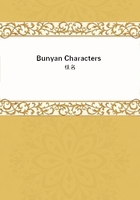
第70章 GIANT DESPAIR(3)
4. 'All hope abandon' was the writing that Dante read over the door of hell. And the two prisoners all but abandoned all hope when they found themselves in Giant Despair's dungeon. Only, Christian, the elder man, had the most distress because their being where they now were lay mostly at his door. All this part of the history also is written in Bunyan's very heart's blood. 'I found it hard work,' he tells us of himself, 'to pray to God because despair was swallowing me up. I thought I was as with a tempest driven away from God. About this time I did light on that dreadful story of that miserable mortal, Francis Spira, a book that was to my troubled spirit as salt when rubbed into a fresh wound; every groan of that man with all the rest of his actions in his dolours, as his tears, his prayers, his gnashing of teeth, his wringing of hands, was as knives and daggers in my soul, especially that sentence of his was frightful to me: "Man knows the beginning of sin, but who bounds the issues thereof?"' We never read anything like Spira's experience and Grace Abounding and Giant Despair's dungeon in the books of our day. And why not, do you think? Is there less sin among us modern men, or did such writers as John Bunyan overdraw and exaggerate the sinfulness of sin? Were they wrong in holding so fast as they did hold that death and hell are the sure wages of sin? Has divine justice become less fearful than it used to be to those who rush against it, or is it that we are so much better men? Is our faith stronger and more victorious over doubt and fear? Is it that our hope is better anchored? Whatever the reason is, there can be no question but that we walk in a liberty that our fathers did not always walk in. Whether or no our liberty is not recklessness and licentiousness is another matter.
Whether or no it would be a better sign of us if we were better acquainted with doubt and dejection and diffidence, and even despair, is a question it would only do us good to put to ourselves. When we properly attend to these matters we shall find out that, the holier a man is, the more liable he is to the assaults of doubt and fear and even despair. We have whole psalms of despair, so deep was David's sense of sin, so high were his views of God's holiness and justice, and so full of diffidence was his wounded heart. And David's Son, when our sin was laid upon Him, felt the curse and the horror of His state so much that His sweat was in drops of blood, and His cry in the darkness was that His God had forsaken Him. And when our spirits are wounded with our sins, as the spirits of all God's great saints have always been wounded, we too shall feel ourselves more at home with David and with Asaph, with Spira even, and with Bunyan. Despair is not good, but it is infinitely better than indifference. 'It is a common saying,' says South, 'and an observation in divinity, that where despair has slain its thousands, presumption has slain its ten thousands. The agonies of the former are indeed more terrible, but the securities of the latter are far more fatal.'
5. 'I will,' says Paul to Timothy, 'that men pray everywhere, lifting up holy hands without doubting.' And, just as Paul would have it, Christian and Hopeful began to lift up their hands even in the dungeon of Doubting Castle. 'Well,' we read, 'on Saturday night about midnight they began to pray, and continued in prayer till almost break of day. Now, before it was day, good Christian, as one half amazed, broke out in this passionate speech: "What a fool," quoth he, "am I thus to lie in a stinking dungeon when I may as well walk at liberty; I have a key in my bosom, called Promise, that will, I am persuaded, open any lock in all Doubting Castle."
Then said Hopeful: "That's good news, good brother; pluck it out of thy bosom and try."' Then Christian pulled the key out of his bosom and the bolt gave back, and Christian and Hopeful both came out, and you may be sure they were soon out of the giant's jurisdiction.